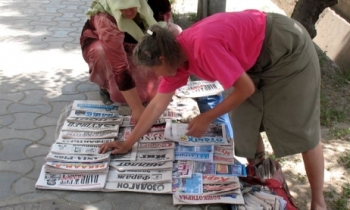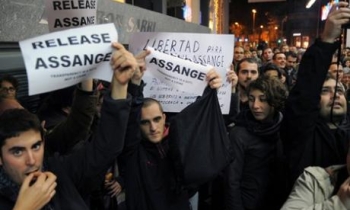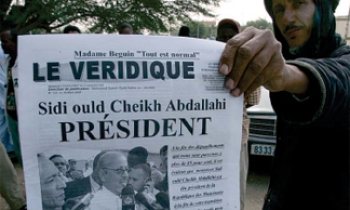KATMANDU, Nepal -- A general strike shut down schools, businesses and transportation in the capital Friday in a protest of new laws restricting the media for criticizing Nepal's king.
Nepal's seven major political parties called the strike to oppose new regulations that let authorities shut down newspapers and radio stations and jail journalists.
The new laws, imposed Oct. 9, make publishing or broadcasting criticism of Nepal's king punishable by up to two years in prison. They also raise the maximum fine for newspapers or journalists who criticize the royal government by 10 times to $7,000 and give authorities the power to revoke journalists' credentials.
About 1,000 journalists, activists, students, lawyers and teachers rallied in the center of Katmandu, demanding the government withdraw the law. Police detained at least 50 activists at a separate demonstration earlier.
"We want press freedom! Take back the black law!" the protesters chanted.
Hundreds of police patrolled the streets but allowed the demonstration to take place.
"We called the strike to oppose the attack on media organizations, journalists and the new law," said Subash Nemwang, of the Communist Party of Nepal.
The main parties have been organizing street protests to demand restoration of democracy in the Himalayan kingdom since constitutional monarch King Gyanendra seized absolute power Feb. 1, firing the government and forming his own.
The king has launched a crackdown on dissent, saying it was necessary to combat a growing communist insurgency.
Dozens of reporters have been arrested since the king took absolute power, and three are still believed to be still behind bars.
Any criticism of the royal government and security forces has been banned, along with any independent news reporting on the insurgency by Maoist rebels who have been fighting since 1996 to establish a communist state in Nepal. About 12,000 people have died in the conflict.
On Thursday, the Supreme Court issued an interim ruling ordering the government not to take any action against radio station Kantipur, which the royal government had threatened to shut down for disobeying a ban on news reports. The government had ordered private stations to broadcast only entertainment programs.
The court ordered the government not to close down the station -- part of the country's largest media group -- or to suspend its broadcast license until a Supreme Court hearing next week.
Dozens of police raided Kantipur last week, seizing its studio and transmission equipment.







